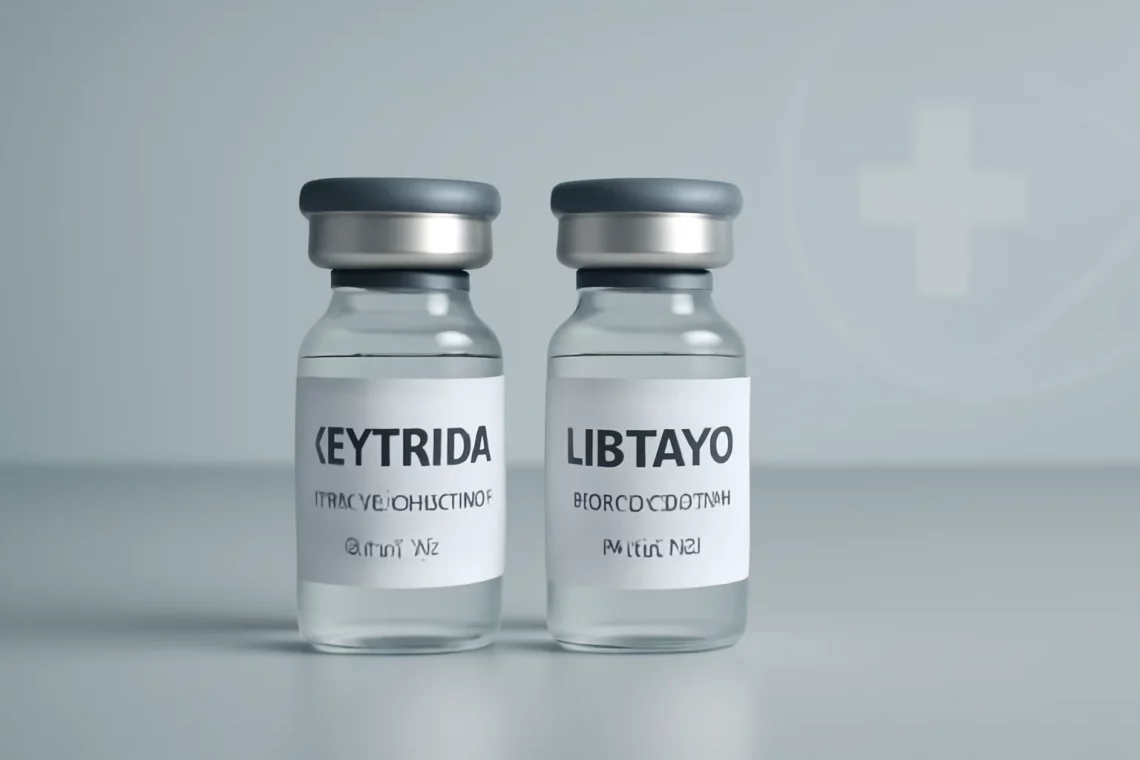
Keytruda vs Libtayo: A Comprehensive Comparison of Cancer Treatments
Keytruda and Libtayo are two prominent immunotherapy drugs utilized in the treatment of various cancers. As the field of oncology rapidly evolves, these medications have emerged as significant options for patients battling conditions such as melanoma, lung cancer, and other malignancies. Both drugs are designed to harness the body’s immune system to identify and attack cancer cells, offering a more targeted approach compared to traditional chemotherapy.
The mechanisms of action behind Keytruda and Libtayo involve blocking specific proteins that inhibit immune responses, thereby allowing T-cells to recognize and destroy cancerous cells more effectively. The choice between these two therapies can be influenced by various factors, including the specific cancer type, patient health, and individual preferences regarding treatment side effects. As more clinical data becomes available, healthcare professionals strive to provide personalized treatment plans that optimize outcomes while minimizing adverse effects.
In this article, we delve into the characteristics, effectiveness, and considerations surrounding Keytruda and Libtayo, exploring how they compare as therapeutic options in the fight against cancer.
Understanding Keytruda: Mechanism and Applications
Keytruda, generically known as pembrolizumab, is a monoclonal antibody that works by inhibiting the programmed cell death protein 1 (PD-1) pathway. PD-1 is a checkpoint protein found on T-cells, which are crucial components of the immune system. Cancer cells often exploit this pathway to evade immune detection, leading to tumor growth and progression. By blocking PD-1, Keytruda enhances the ability of T-cells to recognize and attack cancer cells.
Since its approval, Keytruda has been utilized in treating various types of cancers, including melanoma, non-small cell lung cancer (NSCLC), head and neck cancer, and several others. Its versatility is one of its most significant advantages, as it can be administered as a monotherapy or in combination with other treatments such as chemotherapy or targeted therapies.
Clinical trials have demonstrated the efficacy of Keytruda in improving overall survival rates for patients with advanced or metastatic cancers. Its ability to provide durable responses means that some patients experience long-lasting benefits even after treatment ends. However, like all medications, Keytruda is not without side effects. Common adverse reactions include fatigue, rash, and immune-related conditions such as pneumonitis or colitis.
Healthcare providers closely monitor patients on Keytruda for any signs of these side effects, ensuring timely intervention when necessary. The decision to use Keytruda often involves a thorough discussion between the patient and their medical team, weighing the potential benefits against the risks.
Exploring Libtayo: Unique Features and Efficacy
Libtayo, or cemiplimab, is another immune checkpoint inhibitor that targets PD-1, similar to Keytruda. However, Libtayo is primarily approved for the treatment of cutaneous squamous cell carcinoma (CSCC) and certain types of non-small cell lung cancer. Its unique approval for CSCC makes it particularly valuable for patients who may not respond well to other therapies or who have advanced disease that is not amenable to surgery.
The mechanism of action of Libtayo mirrors that of Keytruda, as it blocks PD-1 and allows the immune system to better recognize and attack cancer cells. Clinical studies have shown that Libtayo is effective in achieving tumor reduction in patients with advanced CSCC, offering a new hope for those affected by this aggressive skin cancer.
One of the distinguishing features of Libtayo is its safety profile. While it shares common side effects with other immunotherapies, such as fatigue and skin reactions, some studies suggest that patients may experience a different incidence or severity of specific adverse reactions compared to Keytruda. This can play a crucial role in the decision-making process, especially for patients with pre-existing conditions or those who are particularly sensitive to medication side effects.
As research continues, the understanding of Libtayo’s long-term effectiveness and potential combination therapies is evolving. Ongoing clinical trials aim to elucidate the best treatment strategies for patients using Libtayo, particularly in conjunction with other therapeutic modalities.
Comparative Effectiveness: Keytruda vs. Libtayo
When comparing Keytruda and Libtayo, it’s essential to consider their respective indications, efficacy, and patient experiences. Both medications have demonstrated significant effectiveness in treating various malignancies, but their unique profiles may make one more suitable than the other depending on individual patient circumstances.
Keytruda has a broader range of applications, making it a go-to choice for many oncologists treating multiple cancer types. In contrast, Libtayo’s specific indication for cutaneous squamous cell carcinoma presents it as a more tailored option for patients dealing with this particular type of skin cancer.
Clinical data suggests that both therapies can lead to substantial improvements in overall survival and quality of life for patients. However, the choice often hinges on specific factors such as the cancer stage, prior treatments, and individual patient health profiles.
For instance, in patients with non-small cell lung cancer, studies show that both Keytruda and Libtayo can be effective, but Keytruda may have a more established record of use in this area. Conversely, for patients with advanced CSCC, Libtayo may be favored due to its targeted approval.
The side effect profiles of both medications also influence treatment decisions. While both drugs can cause immune-related adverse events, the severity and frequency can differ. Patients’ tolerance to side effects, along with their previous treatment experiences, play vital roles in determining the best immunotherapy option.
Ultimately, the decision between Keytruda and Libtayo should be made collaboratively between the patient and their healthcare provider, ensuring that all factors are considered for a personalized approach to cancer treatment.
Future Directions and Research in Immunotherapy
The landscape of cancer treatment is rapidly changing, with immunotherapy at the forefront of innovative approaches. As research continues to unfold, both Keytruda and Libtayo are likely to play significant roles in the future of oncology.
Ongoing clinical trials are investigating the potential of both drugs in various combinations with other therapies, such as targeted agents, chemotherapy, and novel immunotherapeutics. These studies aim to determine the most effective treatment protocols that maximize response rates while minimizing adverse effects.
Additionally, the exploration of biomarkers that predict response to treatment is an exciting area of research. Understanding which patients are most likely to benefit from Keytruda or Libtayo could lead to more personalized treatment plans, enhancing the overall efficacy of these therapies.
Furthermore, the development of new formulations and delivery methods may improve patient experiences and outcomes. As the science of immunotherapy advances, new drugs may emerge that further enhance the capabilities of existing therapies, providing even more options for patients facing cancer.
As we look to the future, the integration of immunotherapy into standard treatment protocols will likely continue to expand, offering hope and improved outcomes for countless patients worldwide.
**Disclaimer: This article is for informational purposes only and does not constitute medical advice. For any health concerns or conditions, it is essential to consult with a qualified healthcare professional.**




